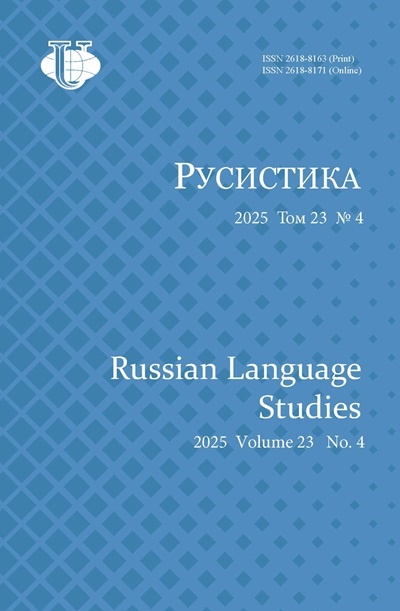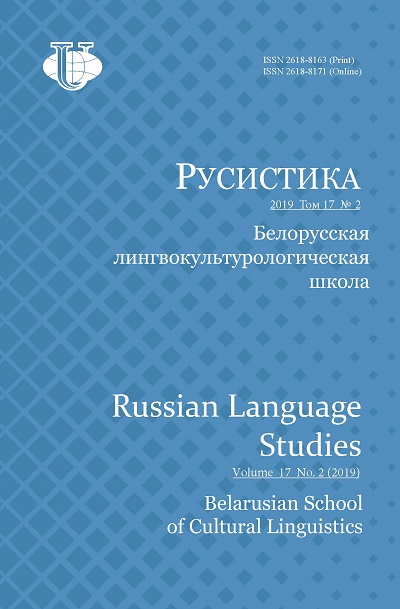Ключевой концепт как структурирующее начало языковой картины мира у белорусов и русских
- Авторы: Пивовар Е.С.1
-
Учреждения:
- Витебская ордена «Знак Почета» государственная академия ветеринарной медицины
- Выпуск: Том 17, № 2 (2019): Белорусская лингвокультурологическая школа
- Страницы: 243-254
- Раздел: Страничка молодого ученого
- URL: https://journals.rudn.ru/russian-language-studies/article/view/21118
- DOI: https://doi.org/10.22363/2618-8163-2019-17-2-243-254
- ID: 21118
Цитировать
Полный текст
Аннотация
Статья посвящена сравнительно-сопоставительному анализу ключевых концептов языковых картин мира белорусов и русских, таких как «Родина», «язык», «воля». Наиважнейшим источником реконструкции концептов послужили художественные тексты классиков русской и белорусской литератур. Актуальность работы обусловлена новизной представленного языкового материала и недостаточностью сравнительно-сопоставительного анализа ключевых концептов различных лингвокультур. Особый интерес в этом плане вызывает языковая картина близкородственных народов: выявление универсального и национально-специфического компонентов в структурах ключевых концептов позволило сделать вывод о схожести, но не тождественности ментальности русских и белорусов. Планируется продолжить сравнительносопоставительное изучение ключевых концептов (семья, народ, человек и др.) с целью выявления схожих и различных черт не только отдельных концептов, но и национальных концептосфер русских и белорусов. В работе использованы общелингвистические методы (описательный, сравнительно-сопоставительный) и методы лингвокультурологии и когнитивной лингвистики (лингвокультурологическая и семантико-когнитивная методики изучения текста). Статья подготовлена под научным руководством доктора филологических наук, профессора В.А. Масловой.
Об авторах
Екатерина Сергеевна Пивовар
Витебская ордена «Знак Почета» государственная академия ветеринарной медицины
Автор, ответственный за переписку.
Email: eka15580575@yandex.ru
кандидат филологических наук, старший преподаватель кафедры иностранных языков, Витебская ордена «Знак Почета» государственная академия ветеринарной медицины» (Витебск, Республика Беларусь). Сфера научных интересов: лингвистика текста, лингвокультурология, когнитивная лингвистика. Автор более 50 научных работ, среди которых монография «Белорусская ментальность в языковом пространстве художественного текста».
Республика Беларусь, 210026, Витебск, ул. Доватора, 7/11Список литературы
- Арутюнова Н.Д. Язык и мир человека. М.: Языки русской культуры, 1999. 896 с.
- Бартминьский Е. Языковой образ мира: очерки по этнолингвистике. М.: Индрик, 2005. 528 с.
- Бердяев Н. Судьба России. М.: Русский путь. 2004. 704 с.
- Вежбицкая А. Язык. Культура. Познание. М.: Русское слово, 1997. 411 с.
- Вежбицкая А. Понимание культур через посредство ключевых слов. М.: Языки славянской культуры, 2001. 287 с.
- Воркачев С.Г. Singularia tantum: идеологема «народ» в русской лингвокультуре: монография. Волгоград: Парадигма, 2013. 254 с.
- Гимаев Я.А. Актуализация концепта РОДИНА в школьных учебниках по литературе и в массовом сознании учащихся: автореф. дис. … канд. филол. наук. М.: Мос. гос. обл. ун-т., 2010. 26 с.
- Есмурзаева Ж.Б. Концепт Родина в педагогическом дискурсе на рубеже XX-XXI вв.: дис. ... канд. филол. наук. Омск: Ом. гос. ун-т, 2010. 209 с.
- Карасева Ю.А. Художественный текст как источник национально-культурной информации и выразитель национальной ментальности (на материале произведений художественной литературы стран Андской культурно-исторической зоны): автореф. дис. … канд. филол. наук. М.: РУДН, 2012. 24 с.
- Карасик В.И. Языковые ключи. Волгоград: Парадигма, 2007. 520 с.
- Катаева Н.М. Воля. Антология концептов / под ред. В.И. Карасика, И.А. Стернина. Т. 1. Волгоград: Парадигма, 2005. С. 44-60.
- Маслова В.А. Лингвокультурология: учебное пособие. М.: Академия, 2001. 208 с.
- Маслова В.А. Поэт и культура: концептосфера Марины Цветаевой. М.: Флинта, 2004. 256 с.
- Маслова В.А. Национальный характер сквозь призму языка: монография. Витебск: Витеб. гос. ун-т., 2011. 76 с.
- Милованова Г.Н. Родной язык // Антология концептов / под ред. В.И. Карасика, И.А. Стернина. Т. 3. Волгоград: Парадигма, 2006. С. 39-50.
- Пименова М.В. Языковая картина мира: учебное пособие. Кемерово: Кем. гос. ун-т, 2011. 105 с.
- Полиниченко Д.Ю. Язык. Антология концептов / под ред. В.И. Карасика, И.А. Стернина. Т. 1. Волгоград: Парадигма, 2005. С. 343-358.
- Словарь афоризмов русских писателей / сост. А.В. Королькова, А.Г. Ломов, А.Н. Тихонов. М.: Рус. яз. - Медиа, 2004. 636 с.
- Тавдгиридзе Л.А. Русский язык. Антология концептов / под ред. В.И. Карасика, И.А. Стернина. Волгоград: Парадигма, 2006. Т. 3. С. 6-39.
- Телия В.Н. Наименование РОДИНА как часть социального концепта «Patria» в русском языке // Языковая категоризация: материалы круглого стола, посвященного юбилею Е.С. Кубряковой. М.: Наука, 1997. С. 77-79.
- Солохина А.С. Отношение к свободе в русской паремиологии // Проблемы современной лингвистики: сборник научных трудов / под ред. Н.А. Красавского. Волгоград: Колледж, 2003. С. 37-42.
- Степанов Ю.С. Константы. Словарь русской культуры. Опыт исследования. М.: Языки русской культуры, 1997. 824 с.
- Мячкоўская Н.Б. Мовы і культура Беларусі: нарысы. Мінск: Права і эканоміка, 2008. 347 с.
- Півавар К.С. Беларуская ментальнасць у моўнай прасторы мастацкага тэксту: манаграфія. Віцебск: Віцеб. дзярж. ун-т, 2015. 155 с.
Дополнительные файлы














